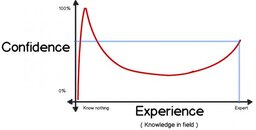R
redacted
Guest
I have developed a set of absolute rules for myself (no one else) the first of which is:
- You are always diving solo no matter how many divers are in the water, or how many buddies you have, or how much experience they have or what you discussed during the dive plan.
Because of that I am always fully equipped and prepared to take complete care of myself especially if doing the more dangerous form of diving - with a "buddy".
It really is a shame to never experience a good buddy. It is really quite efficient and effective. It makes travel a bit easier (lighter). I love solo but I also love diving with my wife and other good buddies. But it does require a degree of mutual trust and cooperation.
---------- Post added April 5th, 2015 at 10:54 AM ----------
-If my fin strap brakes, I don't assume fins are dangerous, I fix it or replace it with new ones
Other ideas pretty good. But I chose to replace my fin straps with springs before one had a chance to fail.






 Fortunately, the 'separation' lasted only a few seconds, but I think I learned a lesson.
Fortunately, the 'separation' lasted only a few seconds, but I think I learned a lesson.